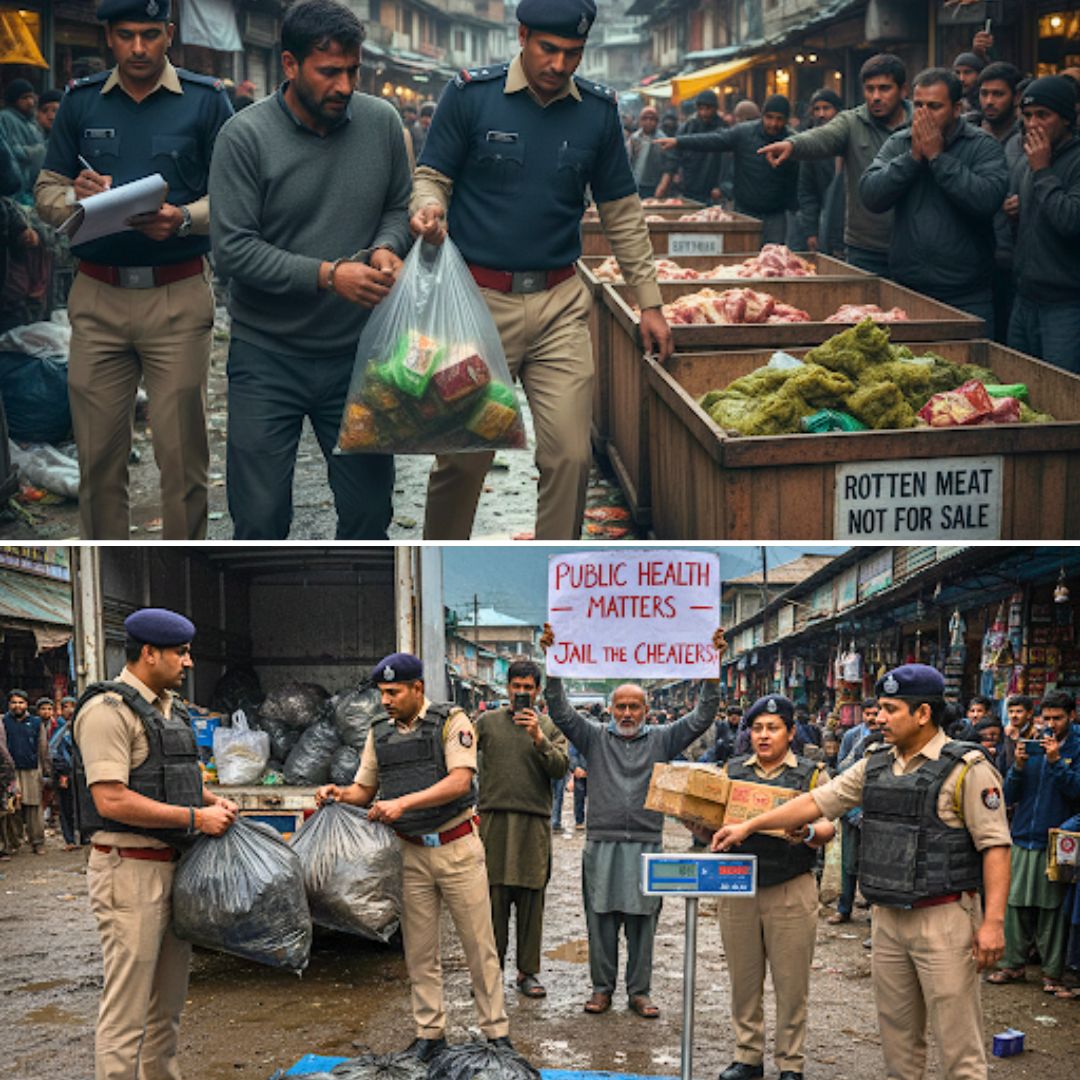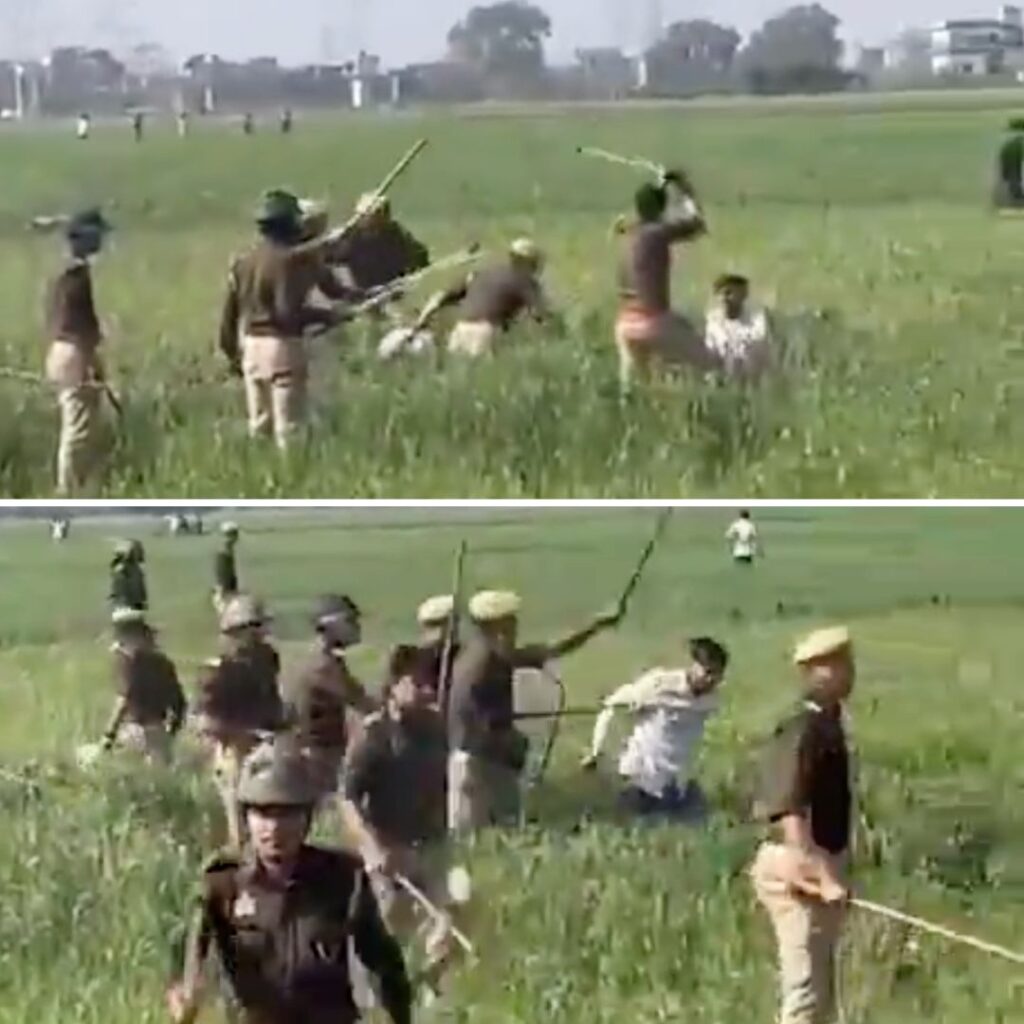Two individuals were arrested in Jammu and Kashmir’s Ganderbal district on Friday for allegedly selling rotten meat and expired food items, police officials said. The arrests followed credible information leading to raids at two points in Kondabal Safapora and Beehama areas, where a significant quantity of rotten meat products, including boiled items like kebabs and ristas, as well as expired consumables, were seized.
Police registered two FIRs and investigations are underway. These actions are part of a wider crackdown in the valley where over 5,000 kg of rotten meat has been confiscated recently, prompting strong responses from authorities and residents concerned about public health.
Rotten Meat Controversy
The rotten meat controversy in Jammu and Kashmir gained significant public attention in early August 2025 when authorities seized over 12,000 kilograms of rotten chicken, mutton, and fish intended for distribution to restaurants and street food vendors across the valley.
This scandal exposed a large, unregulated supply chain that sourced rejected meat from Delhi’s Ghazipur mandi-the largest livestock market in Asia, where unsellable meat was chemically treated with chlorine, ammonium hydroxide, and nitrate acids to mask decay and make it appear fresh.
This fakery enabled its transportation in trucks to Kashmir, where the meat was sold to hotels, eateries, and street vendors, posing severe health risks to consumers. The revelation triggered widespread public outrage, seriously damaging Kashmir’s hospitality sector, renowned for its meat-based cuisine, and compelling many restaurants to temporarily shift to vegetarian menus to retain customers amid mounting fears.
Impact on Public Health and Food Industry
The scale of the scandal raised urgent concerns about food safety and public health in the region. Authorities found rotten meat stored in unsanitary conditions without proper refrigeration and with the use of synthetic colours to disguise its spoilage. Some decomposed meat was even found illegally dumped in marshes and water bodies, worsening environmental hazards.
Medical experts warned that consumption of such contaminated meat could cause foodborne illnesses including diarrhoea, typhoid, and dysentery. In response, the Food Safety Department intensified inspections and raids, seizing more than 5,000 kg of rotten meat in recent weeks alone, including boiled meat products like kebabs and ristas in Ganderbal, where two arrests were made.
The scandal led to significant business disruptions, with hospitality operators reporting more than 70% drop in customer footfall, layoffs, and operational cutbacks in restaurants and hotels reliant on tourism.
Official Responses and Regulatory Actions
To combat this food safety crisis, Jammu and Kashmir’s government heightened enforcement measures. Checkpoints and food testing laboratories were established near entry points, especially on the Srinagar-Jammu highway, to screen meat consignments before they enter the valley. Mobile food testing vans were deployed near marketplaces to conduct surprise inspections.
The Food and Drug Administration mandated formal registration for all food distributors and vendors, and prescribed strict labelling norms, including batch numbers, manufacturing and expiry dates. Penalties for violations were raised, with fines up to Rs 5 lakh and possible jail terms of up to six years for offenders.
Officials urged food business operators to comply fully with hygiene regulations and standards under the Food Safety and Standards Act, signalling a zero-tolerance approach toward adulterated or rotten meat.
Current Status and Broader Implications
The recent arrests in Ganderbal of two people allegedly selling rotten meat and expired eatables form part of ongoing crackdowns responding to this mounting crisis. Authorities have registered multiple FIRs against stockists and sellers, signaling committed action to dismantle this illegal meat supply network.
The scandal has shaken consumer confidence, disrupted livelihoods in the foodservice industry, and highlighted the vulnerability of food supply chains without robust oversight. It has also sparked a larger conversation about ethical business practices, consumer rights, and the responsibility of regulatory bodies to ensure safe food.
Kashmiri restaurateurs are slowly rebuilding trust by enhancing transparency and hygiene practices, often reaching out to consumers via social media to demonstrate their standards.
The rotten meat controversy in Jammu and Kashmir reveals deep systemic challenges in food safety enforcement and consumer protection. While government action has intensified and the latest arrests are an important step, lasting solutions require sustained vigilance, public awareness, and collaboration among authorities, businesses, and citizens to ensure that food safety never again becomes collateral damage in pursuit of profit.
The Logical Indian’s Perspective
Ensuring safe, hygienic food is a fundamental right integral to public health and dignity. The recent crackdown in Ganderbal and across Kashmir underscores the urgent need for relentless enforcement and collective vigilance to combat unscrupulous practices that endanger lives.
The Logical Indian advocates for transparent governance, consumer education, and community cooperation to foster safer food ecosystems that uphold health and harmony.











